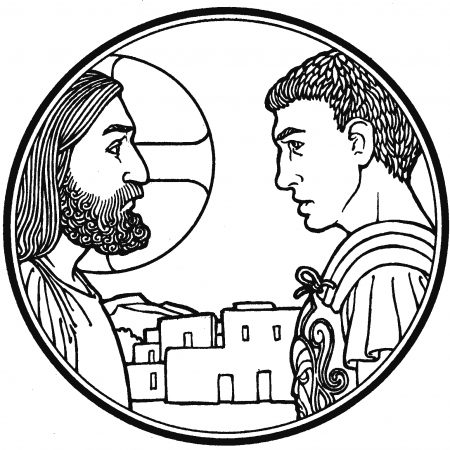The Third Sunday after Epiphany
Matthew 8:1–13
+IN NOMINE IESU +
We tend to reason from our own needs and wants and experiences – that is to say, from ourselves – back to God. We make God in our image. But God made us in his image. This means that if we really want to know God we must listen to what he has to say and take it to heart. God reveals himself. This is what Epiphany is all about. God reveals himself to us in Christ. Where God does not reveal himself to us we remain ignorant and spiritually blind.
This isn’t something we readily accept. We naturally assume that what we want is what God must want. It sounds quite reasonable to us that God should see things as we see things. But we must subordinate our reason to God’s word. What we want is not necessarily what God wants. Faith knows this. This is why faith prays, “Thy will be done.” Our ability to reason things out is a gift from God. It can be a servant of faith. But this is so only when our reason is placed firmly under the authority of God’s word.
To know God’s word is to know how he thinks and what he wants. This requires us to make our reason the servant of the word. When we acknowledge God’s judgment on our thinking we gain spiritual understanding. When we make our reason the master of the word we make ourselves judges over God. This confirms us in ignorance and sends us stumbling into the abyss of spiritual confusion. When it comes to our reason and God’s word, God’s word is the master and our reason is the servant. God is judge. We are not. His word settles everything. The faithful use of our reason places it beneath God’s word so that what God says judges what we think. The faithless use of our reason places it above God’s word to force it to fit into the way we think.
In our text for today we have two examples of sound reasoning that places reason beneath the Word of God where it belongs. The man suffering from leprosy exercised reason rightly when he said to Jesus, “Lord, if you are willing, you can make me clean.” The Roman Centurion exercised reason rightly when he said to Jesus, “Only speak a word and my servant will be healed.” Both of these men were fine Christian theologians, and neither one of them had spent a day at a seminary!
“If you are willing, you can make me clean.” What a wonderful confession of faith! The leper looked at Jesus and saw his God. Jesus is God. God can do what God wants. So this man who was suffering from the pain, loneliness, and isolation of this dreaded disease gave a simple confession of the true faith: “If you are willing, you can make me clean.” God is almighty. We don’t need to ask God what he can do. As Gabriel said to Mary, “With God nothing will be impossible.” So for faith, the question is never: “Can God do it?” The question is: “Does God want to do it?” If he wants to, he will.
But we tend to think that “It won’t work.” That following God’s Word in the 21st Century won’t work. God does what he wants. We don’t always know what God wants. But we often do. How can you know what God wants? And how can you be sure? God’s will is bound to his word and God’s word is bound to his will. If God says it that makes it so and if God doesn’t say it you can imagine, pray, dream, and seek after signs, but you will never know. You cannot know unless God speaks in His Word, revealed in the Holy Scriptures. Only then can you know and believe.
This is what that Roman centurion understood. He was not a Jew. He was not a part of the religious community. He was an outsider who had no rights of membership. Like the leper, he was unclean. He begged Jesus to heal his servant, but he did not ask Jesus to come into his home because he was not worthy to have him come under his roof – not because he was a Gentile and Jesus was a Jew – but because he was a sinner and Jesus was the Lord God in the flesh. This the man knew. Jesus was his Lord and God. And he also knew that since this was so the word that Jesus spoke had authority and power.
A soldier knows something about the power of the spoken word. This man was an officer with soldiers under his authority. He told them what to do and they did it. He exercised his authority by speaking. He reasoned that Jesus would do the same thing. He used his reason, not to lord it over God’s word, but in submission to it. For him faith was very simple. It embraced Jesus his Lord. It rested on whatever Jesus had to say. “But only speak a word, and my servant will be healed.” He knew that Jesus could do what he wanted to do for him. He knew that Jesus’s word was divine power to get the job done. He trusted in Jesus’s word. That’s faith. Jesus commends this faith. He said,
Assuredly, I say to you, I have not found such great faith, not even in Israel! And I say to you that many will come from east and west, and sit down with Abraham, Isaac, and Jacob in the kingdom of heaven. But the sons of the kingdom will be cast out into outer darkness. There will be weeping and gnashing of teeth.
The children of Abraham, Isaac, and Jacob are not the biological descendants of Abraham, Isaac, and Jacob. They are those who hold to the faith of Abraham, Isaac, and Jacob. This Roman military officer would not have been recognized as a member of God’s people outwardly. But he had the true faith. He had the true faith by holding to Jesus’s word and insisting on it and nothing else. What God says is what matters. It doesn’t matter what you think, what you feel, what you want, or what you think you deserve. Everything depends on what God says to you. This is his revealed will on which you can put your trust.
Those who rely on their religious pedigree trust in sinking sand. The sons of the kingdom are in the first instance those unbelieving Jews of Jesus’s day that belonged to the family outwardly but inwardly were estranged from God. They had no faith. That’s because they could not see their own unworthiness. They did not see their need for grace and so they depended on their own virtue instead of on the forgiveness of sins that Jesus alone can provide. And they didn’t see their unworthiness because they did not trust in the Word that Jesus preached and spoke. They trusted in themselves instead. They may have belonged to the people of God of their day because they were of Jewish descent, but they did not belong to Christ and so they were cast out into outer darkness where there is weeping and gnashing of teeth.
Jesus describes hell as a place of darkness. No light can come in. The light God provides in his holy word is shut out and cannot be seen. And since no light of God’s grace can enter, those who are consigned to hell must live in endless regret of what they could have had but do not have. They weep and find no comfort. Their frustration is unending because the Light of the world who enlightens us unto eternal life does not shine his light in hell.
But he shines it here on earth where we live. And from it he enlightens our way to heaven. God’s word gets its light from the Light of the world, Jesus. It is where Jesus displays compassion to sinners suffering from the effects of sin. It shines most brightly where Jesus, the sin bearer, forgives sins. And how does he do so? The Roman Centurion knows how. He speaks the word. Jesus speaks the word and it is done as he says. He who bore our sins on Calvary where he won the right to say that we are forgiven and we are righteous for his sake. He is the one who offered his obedience to God as our champion. He is the one who suffered for all sin on the cross as our substitute. He is the one who speaks the word of absolution that absolves us and removes from us our sins as far as the east is from the west.
So we cling to what the Word of God, as revealed in the Holy Scriptures, says—not just about forgiveness but about everything. When he speaks, we take it to heart, believe it, hold fast to it, and seek to conform our thoughts, words, and deeds to it. When he doesn’t speak, we don’t fret ourselves over what he doesn’t say, but live freely under His divine favor on account of Christ. Amen.



0 Comments